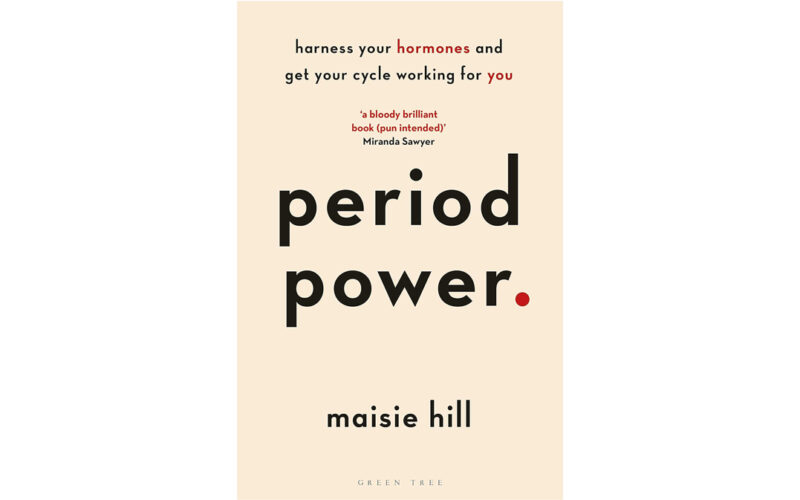The more I think I know about women’s health and menstrual cycles, the more I find there is to learn. This is how I felt while reading Maisie Hill’s book, Period Power: Harness Your Hormones and Get Your Cycle Working for You, a veritable handbook on the menstrual cycle. There were moments where I could sit at her feet and learn from her years of experience, and other moments where I wanted to look her in the eye and strongly disagree. Here’s my recommendation on whether to buy, borrow, or pass on Period Power.
Maisie Hill is a birth doula and experienced women’s health practitioner who holds a Bachelor’s of Science in Acupuncture plus diplomas in Mayan Abdominal Therapy, aromatherapy, and reflexology. As she relates in the introduction, she found over and over again in her work that women have a deep desire to learn more about their natural fertility and menstrual cycle, and how this affects other aspects of their lives, such as relationships, physical health, and mental health. Sharing this knowledge so repeatedly impelled Hill to write this book. She also brings personal experience to the table, as she herself experienced intense period pain for years before finding healing.
Who is the intended audience?
Hill writes this book for any woman who wants to learn more about her body and her cycle. However, she maintains that “Not everyone who is a woman has a menstrual cycle or womb, and not everyone who has a menstrual cycle and a womb is a woman,” going on to say that she prefers to use the term “menstruator” instead of “woman” as it is more inclusive (Hill, 3). While it’s certainly true that not every female menstruates (think: prepubescent girls and postmenopausal women), I found Hill’s failure to acknowledge the biological reality that wombs and menstrual cycles are the sole purview of females, troubling and unhelpful.
What are the main content areas?
Period Power is divided into three big sections. The first section is called “Get to Know Yo’self” and takes a deep dive into female anatomy and what is happening in a normal menstrual cycle. I learned some fascinating tidbits about female anatomy in this section that I had never learned before. Among them, if you are missing one of your fallopian tubes, your ovary on that same side can still release an egg, which can be caught by the tube on the other side!
The second section is called “The Cycle Strategy,” and herein lies the meat of the book. Hill divides the menstrual cycle into four sections, illustrated by the four seasons, starting with “winter,” or menstruation. For each phase, Hill goes into great detail explaining various symptoms your body might be experiencing, the moods and emotions that could be rising to the surface, and cycle syncing strategies to implement in your work, your diet, your relationships, and your leisure, in order to provide optimal support for your changing body and hormones.
The final section of the book is called “Treat Yo’self.” Hill outlines various self-care habits (such as eating to support your cycle and taking a DUTCH test). She also explains sundry causes of wonky cycles, such as polycystic ovary syndrome (PCOS), ovarian cysts, amenorrhea, and premenstrual syndrome/premenstrual dysphoric disorder (PMS/PMDD). Importantly, she shares ways to manage or heal these conditions without hormonal birth control, which she explicitly acknowledges “cannot regulate your cycle because it works by preventing ovulation” (Hill, 305).
Strengths of Period Power
There are quite a number of things to appreciate about this book. Firstly, Maisie Hill is incredibly detailed. From scientific research to client stories, she takes the time to go into every possible layer of each topic. As one example, in her discussion of the follicular phase (13 pages long!), she writes:
A fallopian tube can pick up the egg released from the ovary on the opposite side of the body… One study found that around one-third of spontaneously conceived pregnancies were as a result of the remaining fallopian tube picking up the egg from the ovary on the opposite side of the body. That means that even if your right ovary and your left fallopian tube don’t function or have been removed, your left ovary can release an egg that can be picked up by your right fallopian tube (44).
The female body never ceases to amaze me! And Maisie Hill highlights that wonder repeatedly.
She gets the importance of gut health for hormonal and overall health
Another example of Hill’s attention to detail is in Chapter 8, “Self-care.” I especially appreciated the beginning of this chapter because she does a deep dive into gut health, a topic that I have slowly been appreciating more and more over the years. A subsection titled “Getting the Microbiome off to the Right Start” relates how important it is to begin working on your baby’s gut health while in utero and through vaginal seeding during birth. Hill thoughtfully explains how to expose a baby born via C-section to your vaginal microbiome (a vital part of vaginal birth). When I first picked up Period Power, I have to admit I did not expect to read such explanations!
She too is concerned by the promotion of Depo-Provera use in high-risk populations
Lastly–and this is a small point but an important one–I was very pleased to read about Hill’s concern with the high rates of HIV in Sub-Saharan Africa, and the concurrent push to provide Depo-Provera to the people there, given the connection between Depo use and increased susceptibility to HIV. Hill writes,“Yes, people have a right to access contraception, but that comes with a right to be informed and a right to choose the most appropriate method, and people also have the right to extend their family if they choose to” (183).
Hill believes that women have a right to know their contraceptive options and to make their own informed choices, and she asserts that hormonal birth control can be a good thing for some women. But for the majority of women–those in Sub-Saharan Africa included–she considers Depo a health liability because of all the risks (and lack of informed consent when they aren’t educated on those risks). Hill rightly points out all of the health benefits of menstruation and ovulation, noting that the purported benefits of hormonal birth control often would arguably not outweigh the pluses of cycling naturally.
Limitations or blind spots
As much as I appreciated many things in Maisie Hill’s book, I noted a number of points of departure throughout. I found, for instance, her frequent use of F-bombs and four letter words to be distracting (but YMMV, your perception may differ from mine).
Endorsement of masturbation
Hill frequently endorsed masturbation, whether to alleviate painful periods or as a means of achieving sexual pleasure even when you feel like being alone. This makes sense if the purpose of sex is purely to experience pleasurable sensations via genital stimulation. But if sex means something more, if it’s intended to be an intensely pleasurable and powerfully meaningful gift of self to another, then deliberately eliciting sexual pleasure when alone would be to intentionally cheapen it.
Infantilizing attitude regarding women’s ability to healthily harness and express anger
Additionally, I found Hill’s perspective on female anger, particularly during the premenstrual phase, infantilizing. In her “Highway to hell (Autumn)” chapter, where the rise of progesterone after ovulation is discussed, she mentions that “[t]he sadness and rage you feel in your Autumn is important; it must be recognized, named, and expressed” (153). She goes on to say that the anger we feel when we are PMSing is a clue that something deeper is going on, that it is a manifestation of the rage womankind feels at our collective oppression.
On the one hand, women have indeed suffered from historic medical mistreatment. For instance, Hill reminds readers about the horrific medical practices performed on enslaved Black women in the American South, and the Puerto Rican women who suffered greatly, and without proper consent, during the early trials of the birth control pill.
On the other hand, women are mature, capable creatures who can decide how to respond to their own emotions. Even though our cycles impact our emotional well-being, we still have agency, and are not purely at the mercy of our hormones. But Hill seems to imply the opposite with statements like: “PMS only serves to bring our legitimate feelings to the surface and should not be dismissed” (158). I agree with Hill that I can work with my hormones and emotions, but I would like her to be more clear that I am not controlled by them.
Incoherent perspective on surgeries to alter the genitals
As I mentioned earlier, I found a major limitation in Period Power to be Hill’s choice to use the term “menstruator” rather than “woman.” Given that she spends 15 entire pages describing female anatomy, including highly detailed diagrams, Hill’s subsequent claim that “not everyone who menstruates is a woman” is an incoherent non sequitur (209).
The most striking example of the inconsistency of this position appears in the first section of the book. Lamenting the cultural tendency (often in pornography) to alter the appearance of the vulva and labia, Hill writes:
“Of course, what you choose to do with your body is up to you, but with labiaplasty rates increasing at a scary rate and children reportedly as young as nine years old seeking them out, something has gone awry” (16-17).
Yet, just five pages previous, Hill writes:
“If a person has a gender identity which does not match the genitals they were born with, they can undergo gender confirmation surgery and the penis can become a clitoris, or the clitoris can become a penis. Isn’t modern medicine wonderful” (11)?
I found it bizarre that Hill would be horrified that a child as young as nine years old might be seeking labiaplasty, after championing similar surgeries on gender-confused individuals. Indeed, in both cases, perfectly healthy genitals are being mutilated based on emotional desires (and, in the case of children, on the emotional desires of a person whose prefrontal cortex has not yet fully developed).
Setting aside the book’s limitations, both Hill’s explanations and suggestions for living out one’s “period power” are extremely practical. Any woman, at pretty much any season of life, could pick up this book and find helpful tips for managing her cycle (or lack thereof, such as during pregnancy, breastfeeding, or menopause). In particular, I found her diet-related suggestions to help with leaky gut, estrogen imbalance, and more to be easily applicable. Hill is also very good about giving lists of bullet points and easy-to-understand diagrams, both of which serve to make the material that much more comprehendible.
The verdict: to buy, borrow, or skip altogether?
My personal recommendation is to borrow this book. I certainly think Maisie Hill has a good deal to offer in her book that would be worthwhile reading for any woman who wants to learn more about her cycle. I may return to Period Power again and again, depending on which season of life or stage of my cycle I’m in, but as a mom, I would not be comfortable having this book around for my daughters to casually open, due to its lack of biological clarity surrounding gender issues. In contrast, a similar book that I’m happy to have lying around the house (and have bought) is Fertility, Cycles, and Nutrition, by the late Marilyn Shannon.








Thank you for this great review. I really appreciate it. I also am not comfortable with what is happening to our young people with reassignment it’s child abuse and sorry you can’t become a big if you were born a girl!